- Home
- Jack London
The Turtles of Tasman Page 9
The Turtles of Tasman Read online
Page 9
"Father here?" he asked curtly, though from under the stiff brim of his John B. Stetson he studied the boy closely.
Sizable for his age, he thought. A mite spare in the ribs maybe, and that possibly due to rapid growth. But the face strong and pleasing and the eyes like Uncle Isaac's. When all was said, a darn good sample.
"No, sir," the boy answered, resting on the saw-buck.
"Where is he?"
"At sea," was the answer.
Josiah Childs felt a something very akin to relief and joy tingle through him. Agatha had married again-evidently a seafaring man. Next, came an ominous, creepy sensation. Agatha had committed bigamy. He remembered Enoch Arden, read aloud to the class by the teacher in the old schoolhouse, and began to think of himself as a hero. He would do the heroic. By George, he would. He would sneak away and get the first train for California. She would never know.
But there was Agatha's New England morality, and her New England conscience. She received a regular remittance. She knew he was alive. It was impossible that she could have done this thing. He groped wildly for a solution. Perhaps she had sold the old home, and this boy was somebody else's boy.
"What is your name?" Josiah asked.
"Johnnie," came the reply.
"Last name I mean?"
"Childs, Johnnie Childs."
"And your father's name?-first name?"
"Josiah Childs."
"And he's away at sea, you say?"
"Yes, sir."
This set Josiah wondering again.
"What kind of a man is he?"
"Oh, he's all right-a good provider, Mom says. And he is. He always sends his money home, and he works hard for it, too, Mom says. She says he always was a good worker, and he's better'n other men she ever saw. He don't smoke, or drink, or swear, or do anything he oughtn't. And he never did. He was always that way, Mom says, and she knew him all her life before ever they got married. He's a very kind man, and never hurts anybody's feelings. Mom says he's the most considerate man she ever knew."
Josiah's heart went weak. Agatha had done it after all-had taken a second husband when she knew her first was still alive. Well, he had learned charity in the West, and he could be charitable. He would go quietly away. Nobody would ever know. Though it was rather mean of her, the thought flashed through him, that she should go on cashing his remittances when she was married to so model and steady-working a seafaring husband who brought his wages home. He cudgelled his brains in an effort to remember such a man out of all the East Falls men he had known.
"What's he look like?"
"Don't know. Never saw him. He's at sea all the time. But I know how tall he is. Mom says I'm goin' to be bigger'n him, and he was five feet eleven. There's a picture of him in the album. His face is thin, and he has whiskers."
A great illumination came to Josiah. He was himself five feet eleven. He had worn whiskers, and his face had been thin in those days. And Johnnie had said his father's name was Josiah Childs. He, Josiah, was this model husband who neither smoked, swore, nor drank. He was this seafaring man whose memory had been so carefully shielded by Agatha's forgiving fiction. He warmed toward her. She must have changed mightily since he left. He glowed with penitence. Then his heart sank as he thought of trying to live up to this reputation Agatha had made for him. This boy with the trusting blue eyes would expect it of him. Well, he'd have to do it. Agatha had been almighty square with him. He hadn't thought she had it in her.
The resolve he might there and then have taken was doomed never to be, for he heard the kitchen door open to give vent to a woman's nagging, irritable voice.
"Johnnie!-you!" it cried.
How often had he heard it in the old days: "Josiah!-you!" A shiver went through him. Involuntarily, automatically, with a guilty start, he turned his hand back upward so that the cigar was hidden. He felt himself shrinking and shrivelling as she stepped out on the stoop. It was his unchanged wife, the same shrew wrinkles, with the same sour-drooping corners to the thin-lipped mouth. But there was more sourness, an added droop, the lips were thinner, and the shrew wrinkles were deeper. She swept Josiah with a hostile, withering stare.
"Do you think your father would stop work to talk to tramps?" she demanded of the boy, who visibly quailed, even as Josiah.
"I was only answering his questions," Johnnie pleaded doggedly but hopelessly. "He wanted to know-"
"And I suppose you told him," she snapped. "What business is it of his prying around? No, and he gets nothing to eat. As for you, get to work at once. I'll teach you, idling at your chores. Your father wa'n't like that. Can't I ever make you like him?"
Johnnie bent his back, and the bucksaw resumed its protesting skreek. Agatha surveyed Josiah sourly. It was patent she did not recognise him.
"You be off," she commanded harshly. "None of your snooping around here."
Josiah felt the numbness of paralysis creeping over him. He moistened his lips and tried to say something, but found himself bereft of speech.
"You be off, I say," she rasped in her high-keyed voice, "or I'll put the constable after you."
Josiah turned obediently. He heard the door slam as he went down the walk. As in a nightmare he opened the gate he had opened ten thousand times and stepped out on the sidewalk. He felt dazed. Surely it was a dream. Very soon he would wake up with a sigh of relief. He rubbed his forehead and paused indecisively. The monotonous complaint of the bucksaw came to his ears. If that boy had any of the old Childs spirit in him, sooner or later he'd run away. Agatha was beyond the endurance of human flesh. She had not changed, unless for the worse, if such a thing were possible. That boy would surely run for it, maybe soon. Maybe now.
Josiah Childs straightened up and threw his shoulders back. The great-spirited West, with its daring and its carelessness of consequences when mere obstacles stand in the way of its desire, flamed up in him. He looked at his watch, remembered the time table, and spoke to himself, solemnly, aloud. It was an affirmation of faith:
"I don't care a hang about the law. That boy can't be crucified. I'll give her a double allowance, four times, anything, but he goes with me. She can follow on to California if she wants, but I'll draw up an agreement, in which what's what, and she'll sign it, and live up to it, by George, if she wants to stay. And she will," he added grimly. "She's got to have somebody to nag."
He opened the gate and strode back to the woodshed door. Johnnie looked up, but kept on sawing.
"What'd you like to do most of anything in the world?" Josiah demanded in a tense, low voice.
Johnnie hesitated, and almost stopped sawing. Josiah made signs for him to keep it up.
"Go to sea," Johnnie answered. "Along with my father."
Josiah felt himself trembling.
"Would you?" he asked eagerly.
"Would I!"
The look of joy on Johnnie's face decided everything.
"Come here, then. Listen. I'm your father. I'm Josiah Childs. Did you ever want to run away?"
Johnnie nodded emphatically.
"That's what I did," Josiah went on. "I ran away." He fumbled for his watch hurriedly. "We've just time to catch the train for California. I live there now. Maybe Agatha, your mother, will come along afterward. I'll tell you all about it on the train. Come on."
He gathered the half-frightened, half-trusting boy into his arms for a moment, then, hand in hand, they fled across the yard, out of the gate, and down the street. They heard the kitchen door open, and the last they heard was:
"Johnnie!-you! Why ain't you sawing? I'll attend to your case directly!"
THE FIRST POET
SCENE: A summer plain, the eastern side of which is bounded by grassy hills of limestone, the other sides by a forest. The hill nearest to the plain terminates in a cliff, in the face of which, nearly at the level of the ground, are four caves, with low, narrow entrances. Before the caves, and distant from them less than one hundred feet, is a broad, flat rock, on which are laid several sharp slivers of flint, which, like t
he rock, are blood-stained. Between the rock and the cave-entrances, on a low pile of stones, is squatted a man, stout and hairy. Across his knees is a thick club, and behind him crouches a woman. At his right and left are two men somewhat resembling him, and like him, bearing wooden clubs. These four face the west, and between them and the bloody rock squat some threescore of cave-folk, talking loudly among themselves. It is late afternoon. The name of him on the pile of stones is Uk, the name of his mate, Ala; and of those at his right and left, Ok and Un.
Uk:
Be still!
(Turning to the woman behind him)
Thou seest that they become still. None save me can make his kind be still, except perhaps the chief of the apes, when in the night he deems he hears a serpent… At whom dost thou stare so long? At Oan? Oan, come to me!
Oan:
I am thy cub.
Uk:
Oan, thou art a fool!
Ok and Un:
Ho! ho! Oan is a fool!
All the Tribe:
Ho! ho! Oan is a fool!
Oan:
Why am I a fool?
Uk:
Dost thou not chant strange words? Last night I heard thee chant strange words at the mouth of thy cave.
Oan:
Ay! they are marvellous words; they were born within me in the dark.
Uk:
Art thou a woman, that thou shouldst bring forth? Why dost thou not sleep when it is dark?
Oan:
I did half sleep; perhaps I dreamed.
Uk:
And why shouldst thou dream, not having had more than thy portion of flesh? Hast thou slain a deer in the forest and brought it not to the Stone?
All the Tribe:
Wa! Wa! He hath slain in the forest, and brought not the meat to the Stone!
Uk:
Be still, ye!
(To Ala )
Thou seest that they become still… Oan, hast thou slain and kept to thyself?
Oan:
Nay, thou knowest that I am not apt at the chase. Also it irks me to squat on a branch all day above a path, bearing a rock upon my thighs. Those words did but awaken within me when I was peaceless in the night.
Uk:
And why wast thou peaccless in the night?
Oan:
Thy mate wept, for that thou didst heat her.
Uk:
Ay! she lamented loudly. But thou shalt make thy half-sleep henceforth at the mouth of the cave, so that when Gurr the tiger cometh, thou shalt hear him sniff between the boulders, and shalt strike the flints, whose stare he hatest. Gurr cometh nightly to the caves.
One of the Tribe:
Ay! Gurr smelleth the Stone!
Uk:
Be still!
(To Ala )
Had he not become still, Ok and Un would have beaten him with their clubs… But, Oan, tell us those words that were born to thee when Ala did weep.
Oan (arising):
They are wonderful words. They are such:
The bright day is gone-
Uk:
Now I see thou art liar as well as fool: behold, the day is not gone!
Oan:
But the day was gone in that hour when my song was born to me.
Uk:
Then shouldst thou have sung it only at that time, and not when it is yet day. But beware lest thou awaken me in the night. Make thou many stars, that they fly in the whiskers of Gurr.
Oan:
My song is even of stars.
Uk:
It was Ul, thy father's wont, ere I slew him with four great stones, to climb to the tops of the tallest trees and reach forth his hand, to see if he might not pluck a star. But I said: "Perhaps they be as chestnut-burs." And all the tribe did laugh. Ul was also a fool. But what dost thou sing of stars?
Oan:
I will begin again:
The bright day is gone.
The night maketh me sad, sad, sad-
Uk:
Nay, the night maketh thee sad; not sad, sad, sad. For when I say to Ala, "Gather thou dried leaves," I say not, "Gather thou dried leaves, leaves, leaves." Thou art a fool!
Ok and Un:
Thou art a fool!
All the Tribe:
Thou art a fool!
Uk:
Yea, he is a fool. But say on, Oan, and tell us of thy chestnut-burs.
Oan:
I will begin again:
The bright day is gone-
Uk:
Thou dost not say, "gone, gone, gone!"
Oan:
I am thy cub. Suffer that I speak: so shall the tribe admire greatly.
Uk:
Speak on!
Oan:
I will begin once more:
The bright day is gone.
The night maketh me sad, sad-
Uk:
Said I not that "sad" should be spoken but once? Shall I set Ok and Un upon thee with their branches?
Oan:
But it was so born within me-even "sad, sad-"
Uk:
If again thou twice or thrice say "sad," thou shalt be dragged to the Stone.
Oan:
Owl Ow! I am thy cub! Yet listen:
The bright day is gone.
The night maketh me sad-
Ow! Ow! thou makest me more sad than the night doth! The song-
Uk:
Ok! Un! Be prepared!
Oan (hastily):
Nay! have mercy! I will begin afresh:
The bright day is gone.
The night maketh me sad.
The-the-the-
Uk:
Thou hast forgotten, and art a fool! See, Ala, he is a fool!
Ok and Un:
He is a fool!
All the Tribe:
He is a fool!
Oan:
I am not a fool! This is a new thing. In the past, when ye did chant, O men, ye did leap about the Stone, beating your breasts and crying, "Hai, hai, hai!" Or, if the moon was great, "Hai, hai! hai, hai, hai!" But this song is made even with such words as ye do speak, and is a great wonder. One may sit at the cave's mouth, and moan it many times as the light goeth out of the sky.
One of the Tribe:
Ay! even thus doth he sit at the mouth of our cave, making us marvel, and more especially the women.
Uk:
Be still!… When I would make women marvel, I do show them a wolf's brains upon my club, or the great stone that I cast, or perhaps do whirl my arms mightily, or bring home much meat. How should a man do otherwise? I will have no songs in this place.
Oan:
Yet suffer that I sing my song unto the tribe. Such things have not been before. It may be that they shall praise thee, seeing that I who do make this song am thy cub.
Uk:
Well, let us have the song.
Oan (facing the tribe):
The bright day is gone.
The night maketh me sa-sad.
But the stars are very white.
They whisper that the day shall return.
O stars; little pieces of the day!
Uk:
This is indeed madness. Hast thou heard a star whisper? Did Ul, thy father, tell thee that he heard the stars whisper when he was in the tree-top? And of what moment is it that a star be a piece of the day, seeing that its light is of no value? Thou art a fool!
Ok and Un:
Thou art a fool!
All the Tribe:
Thou art a fool!
Oan:
But it was so born unto me. And at that birth it was as though I would weep, yet had not been stricken; I was moreover glad, yet none had given me a gift of meat.
Uk:
It is a madness. How shall the stars profit us? Will they lead us to a bear's den, or where the deer foregather, or break for us great bones that we come at their marrow? Will they tell us anything at all? Wait thou until the night, and we shall peer forth from between the boulders, and all men shall take note that the stars cannot whisper
… Yet it may be that they are pieces of the day. This is a deep matter.
Oan:
Ay! they are pieces of the moon!
Uk:
What further madness is this? How shall they be pieces of two things that are not the same? Also it was not thus in the song.
Oan:
I will make me a new song. We do change the shape of wood and stone, but a song is made out of nothing. Ho! ho! I can fashion things from nothing! Also I say that the stars come down at morning and become the dew.
Uk:
Let us have no more of these stars. It may be that a song is a good thing, if it be of what a man knoweth. Thus, if thou singest of my club, or of the bear that I slew, of the stain on the Stone, or the cave and the warm leaves in the cave, it might be well.
Oan:
I will make thee a song of Ala!
Uk (furiously):
Thou shalt make me no such song! Thou shalt make me a song of the deer-liver that thou hast eaten! Did I not give to thee of the liver of the she-deer, because thou didst bring me crawfish?
Oan:
Truly I did eat of the liver of the she-deer; but to sing thereof is another matter.
Uk:
It was no labour for thee to sing of the stars. See now our clubs and casting-stones, with which we slay flesh to eat; also the caves in which we dwell, and the Stone whereon we make sacrifice; wilt thou sing no song of those?
Oan:
It may be that I shall sing thee songs of them. But now, as I strive here to sing of the doe's liver, no words are born unto me: I can but sing, "O liver! O red liver!"
Uk:
That is a good song: thou seest that the liver is red. It is red as blood.
Oan:
But I love not the liver, save to eat of it.
Uk:
Yet the song of it is good. When the moon is full we shall sing it about the Stone. We shall beat upon our breasts and sing, "O liver! O red liver!" And all the women in the caves shall be affrightened.
Oan:
I will not have that song of the liver! It shall be Ok's song; the tribe must say, "Ok hath made the song!"
Ok:
Ay! I shall be a great singer; I shall sing of a wolf's heart, and say, "Behold, it is red!"
Uk:
Thou art a fool, and shalt sing only, "Hai, hai!" as thy father before thee. But Oan shall make me a song of my club, for the women listen to his songs.
Oan:
I will make thee no songs, neither of thy club, nor thy cave, nor thy doe's-liver. Yea! though thou give me no more flesh, yet will I live alone in the forest, and eat the seed of grasses, and likewise rabbits, that are easily snared. And I will sleep in a tree-top, and I will sing nightly:

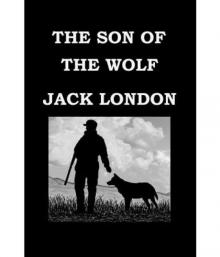 The Son of the Wolf
The Son of the Wolf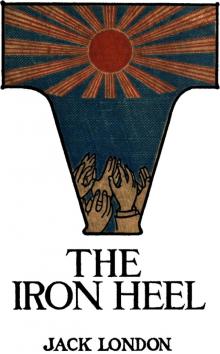 The Iron Heel
The Iron Heel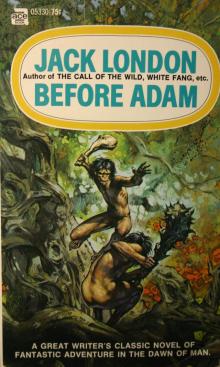 Before Adam
Before Adam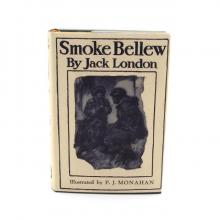 Smoke Bellew
Smoke Bellew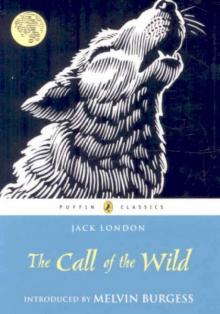 The Call of the Wild
The Call of the Wild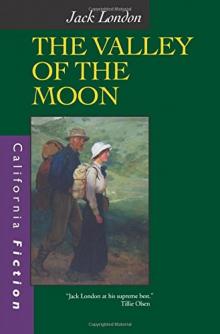 The Valley of the Moon Jack London
The Valley of the Moon Jack London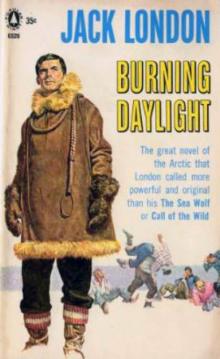 Burning Daylight
Burning Daylight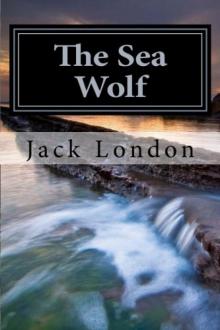 The Sea Wolf
The Sea Wolf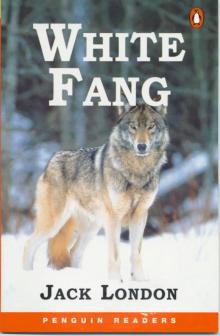 White Fang
White Fang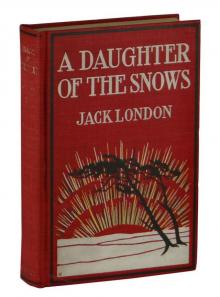 A Daughter of the Snows
A Daughter of the Snows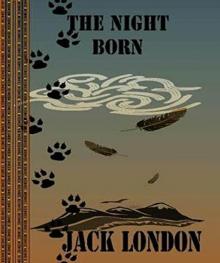 The Night-Born
The Night-Born A Son Of The Sun
A Son Of The Sun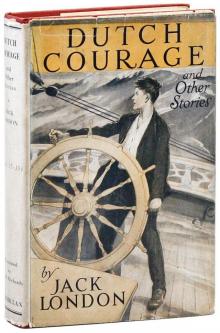 Dutch Courage and Other Stories
Dutch Courage and Other Stories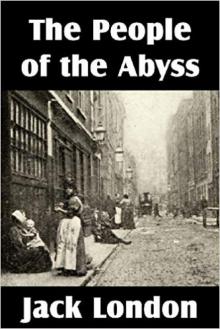 The People of the Abyss
The People of the Abyss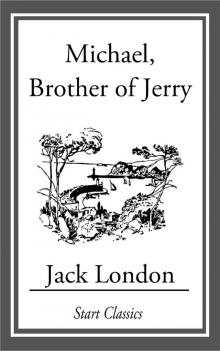 Michael, Brother of Jerry
Michael, Brother of Jerry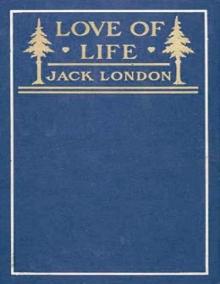 Love of Life, and Other Stories
Love of Life, and Other Stories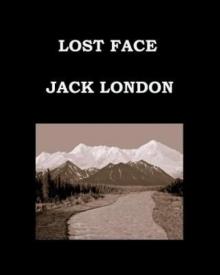 Lost Face
Lost Face The Road
The Road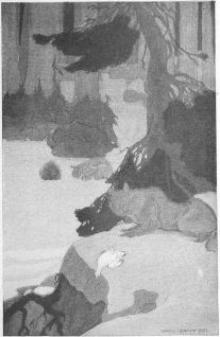 Love of Life
Love of Life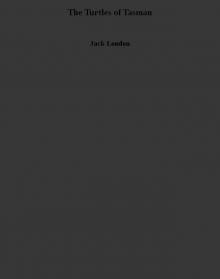 The Turtles of Tasman
The Turtles of Tasman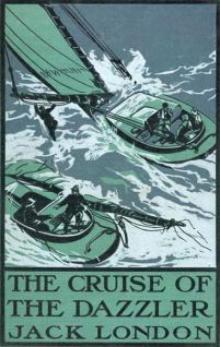 The Cruise of The Dazzler
The Cruise of The Dazzler The Heathen
The Heathen The Scab
The Scab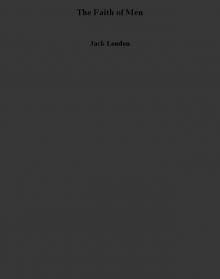 The Faith of Men
The Faith of Men Adventure
Adventure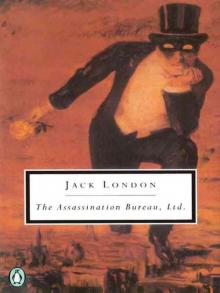 The Assassination Bureau, Ltd.
The Assassination Bureau, Ltd.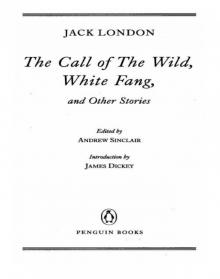 The Call of the Wild, White Fang, and Other Stories
The Call of the Wild, White Fang, and Other Stories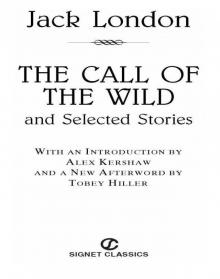 The Call of the Wild and Selected Stories
The Call of the Wild and Selected Stories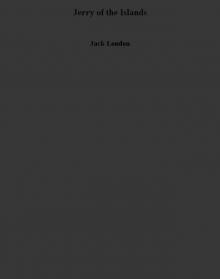 Jerry of the Islands
Jerry of the Islands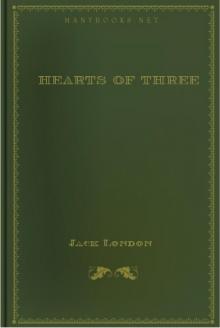 Hearts of Three
Hearts of Three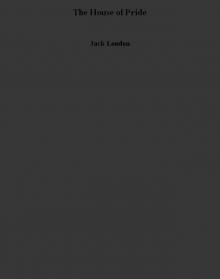 The House of Pride
The House of Pride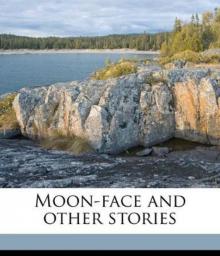 Moon-Face and Other Stories
Moon-Face and Other Stories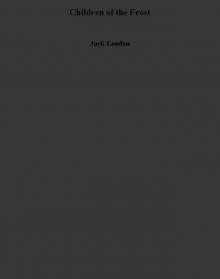 Children of the Frost
Children of the Frost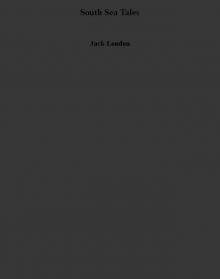 South Sea Tales
South Sea Tales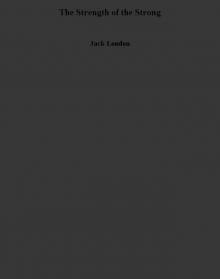 The Strength of the Strong
The Strength of the Strong The Jacket (The Star-Rover)
The Jacket (The Star-Rover)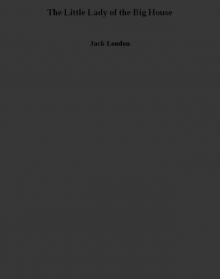 The Little Lady of the Big House
The Little Lady of the Big House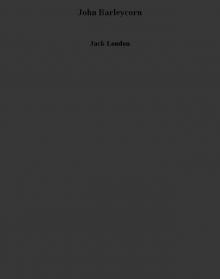 John Barleycorn
John Barleycorn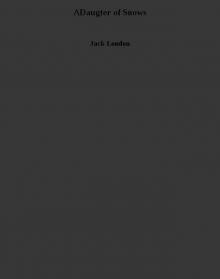 ADaugter of Snows
ADaugter of Snows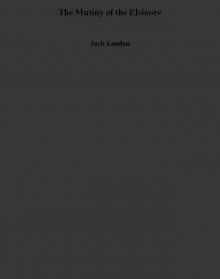 The Mutiny of the Elsinore
The Mutiny of the Elsinore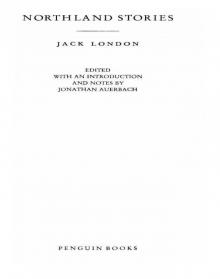 Northland Stories
Northland Stories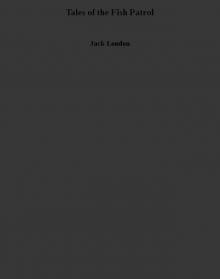 Tales of the Fish Patrol
Tales of the Fish Patrol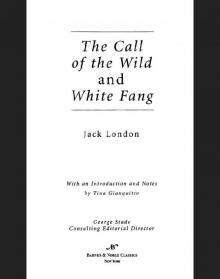 Call of the Wild and White Fang (Barnes & Noble Classics Series)
Call of the Wild and White Fang (Barnes & Noble Classics Series)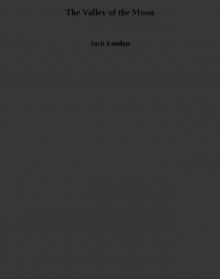 The Valley of the Moon
The Valley of the Moon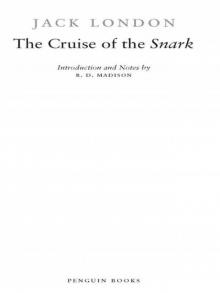 The Cruise of the Snark
The Cruise of the Snark The Game
The Game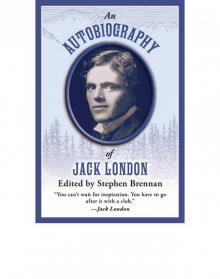 An Autobiography of Jack London
An Autobiography of Jack London